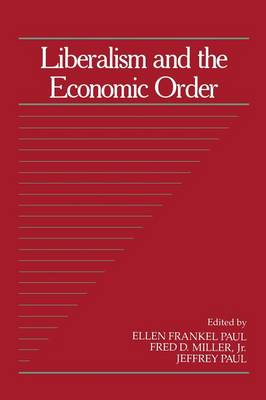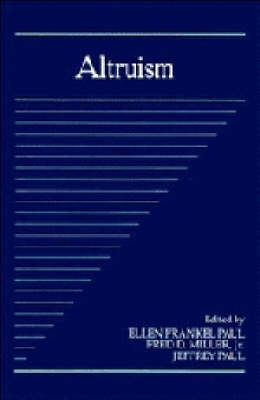Social Philosophy and Policy
6 total works
Freedom of Speech: Volume 21, Part 2
by Ellen Frankel Paul, Fred D. Miller Jr, and Jeffrey Paul
Published 5 July 2004
Whether free speech is defended as a fundamental right that inheres in each individual, or as a guarantee that all of society's members will have a voice in democratic decision-making, the central role of expressive freedom in liberating the human spirit is undeniable. Freedom of expression will, as the essays in this volume illuminate, encounter new and continuing controversies in the twenty-first century. Advances in digital technology raise pressing questions regarding freedom of speech and, with it, intellectual property and privacy rights. Campaign finance reform limits the formerly sacrosanct category of 'political speech'. Expressive liberties may face their greatest challenge from government efforts to thwart terrorism. The twelve legal scholars and philosophers whose work appears in this volume examine the history of free speech doctrine, its relevance to other social and personal values, and the radical critiques it has withstood in recent years.
Liberalism and the Economic Order
by Ellen Frankel Paul, Fred D. Miller Jr, and Jeffrey Paul
Published 30 July 1993
With the collapse of communist totalitarianism, the countries of Eastern Europe and the former Soviet Union face political instability and an uncertain economic future. The people of the region are struggling to emulate the success of the West by moving toward Western-style democracy and markets. The essays in this volume address the liberal transition currently underway. Some of them explore the models offered by political theorists to guide the course of reforms. Some discuss obstacles to change posed by existing attitudes, institutions and cultural traditions. Some examine the nature of liberalism itself, and consider whether democratic politics and free-market economics can coexist without undermining one another. Some offer alternatives to specific Western institutions, arguing that in certain cases it would be unwise for the East to follow the West. Addressing the issues from a variety of perspectives, the contributors to this volume offer valuable insights into the nature of liberalism and the problems facing liberal reformers today.
What Should Constitutions Do?
by Ellen Frankel Paul, Jr Fred Miller, Jeffrey Paul, and Fred D. Miller Jr
Published 1 January 2011
The essays in this volume - written by prominent philosophers, political scientists and legal scholars - address the basic purposes of constitutions and their status as fundamental law. Some deal with specific constitutional provisions: they ask, for example, which branches of government should have the authority to conduct foreign policy, or how the judiciary should be organized, or what role a preamble should play in a nation's founding document. Other essays explore questions of constitutional design: they consider the advantages of a federal system of government, or the challenges of designing a constitution for a pluralistic society - or they ask what form of constitution best promotes personal liberty and economic prosperity.
Questions regarding the foundations of ethics and politics have intrigued philosophers ever since Socrates first pointed out their importance. Many philosophers have agreed with the ancient Greeks that we cannot obtain the knowledge we need to lead the best lives as individuals or to pursue the wisest public policies unless we are guided by a correct normative theory providing basic definitions, analyses, or explications of concepts such as "good:" and "bad" and "right" and "wrong", and basic judgments or principles regarding good things and right actions. However, the task of providing a correct account of the foundations of moral and political philosophy is both difficult and perplexing. There has recently been an enthusiastic revival of interest on the part of moral and political philosophers concerning such foundations, which promises to continue unabated through the rest of the 20th century. It is a field of great ferment and diversity, as reflected by the nine internationally-regarded philosophers who have written essays for this volume.
Altruism: Volume 10, Part 1
by Ellen Frankel Paul, Fred D. Miller Jr, and Jeffrey Paul
Published 26 March 1993
Confronting crucial and difficult issues, the ten authors whose essays appear in this volume offer fresh perspectives on the nature and value of altruism. This collection of essays on moral philosophy deal with the balance to be struck between egoism and altruism - that is, between pursuing one's own interests and serving the interest of others - and with related issues. Contributions examine the relationship between altruism and rationality; consider cases in which one's personal needs and goals may legitimately be given priority over the needs of others; question whether, and under what conditions, we may properly be forced to serve others' interests; and examine the role government should play in regulating our interactions.
After Socialism: Volume 20, Part 1
by Ellen Frankel Paul, Fred D. Miller Jr, and Jeffrey Paul
Published 3 February 2003
In this collection, twelve philosophers, historians, and political philosophers-scholars with a diverse set of disciplinary and political leanings-assess aspects of socialism in light of its recent reversals. Some of the essays consider what made the socialist project seem compelling to its advocates, examining the moral and political values that made socialism appealing to intellectuals. Others evaluate whether there are aspects of socialism that ought to be preserved, such as its quest for equality and community. Some essays examine whether free-market systems need to be further modified in response to ongoing socialist critiques. Several others argue for the continuing validity of socialism in its social democratic incarnation, suggesting ways in which socialism may still have a productive future. Still others condemn the socialist project as inherently misguided in theory, while also portraying 'really existing socialism' as cataclysmic in practice.



